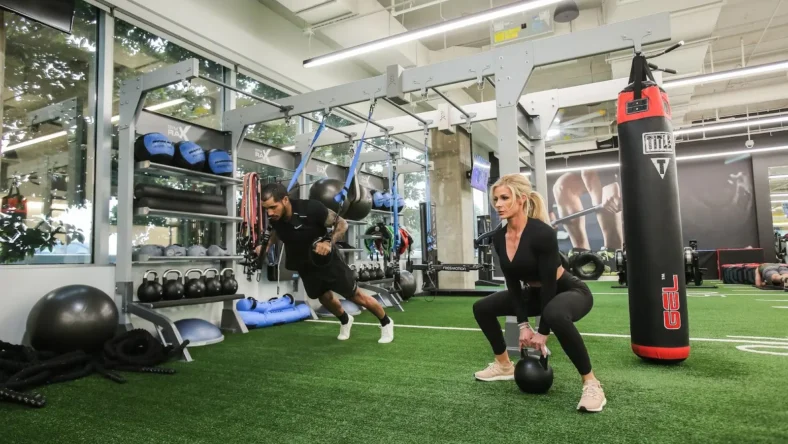
Open floor plans, recovery services and digital content are must-haves for gyms and other fitness facilities looking to win in 2024 and beyond
This article is part of ATN’s DISRUPT 2023 video series, which features key conversations with executives from the most successful brands in fitness and wellness. To watch more videos, click here
While people have returned to in-person fitness in larger numbers than some industry experts predicted during the throes of the pandemic, the reality is that gyms and studios are facing stiff competition not just from each other, but from the many digital options today’s consumers have.
To attract and retain members in a world teeming with workout options, operators will need to leverage space, technology and wellness services in innovative and engaging ways.
“It’s about building these immersive environments where it’s worth the price of inconvenience to get there,” summarized Bryan Green, founder and CEO of Aktiv Solutions, a leading commercial and home gym design company.
Here are a few ways facilities can go about creating those immersive environments, according to Green and three other fitness and wellness industry executives, all of whom shared the virtual stage during the “Gym of the Future” panel at DISRUPT 2023 presented by Athletech News.
Create ‘Energy & Atmosphere’ Through Physical Space
Gone are the days of the big-box gym filled to the brim with cardio machines and single-exercise strength training equipment. The gym of the future is open, with less equipment and more room for community and connection.
“The industry has gone through a major shift post-COVID, probably 25 to 30%, maybe even 35%, of the cardio equipment is either not being used or has been removed,” noted Jeff Esswein, vice president of business development commercial sales U.S. and Canada for Freemotion Fitness. “When you look at the commercial setting, … there’s been a lot more focus on movement, functional training and strength training.”
Green, too, has noticed a “tremendous thinning out of equipment” at fitness facilities, which are increasingly favoring functional training spaces with large, open floor plans.
This change in layout is partly due to the rising popularity of strength training, Green notes. But he says it presents an opportunity for gyms to create engaging spaces for their members to interact with personal trainers and other gym goers, mimicking some of the community aspects commonly found in boutique fitness settings.
“Energy begets energy,” Green notes. “Getting people together, not necessarily training together in the same class per se, but training amongst each other, creating that collective energy … but also a sense of purpose and reason.”

Gyms should take advantage of open spaces on the fitness floor by encouraging personal trainers to offer live guidance to members, Green advises. If live guidance isn’t possible, operators should look to offer virtual coaching through tools like digital screens, he says.
“Opening up floor plans, creating a guided solution, and creating atmosphere and experience, ultimately, are the keys,” Green says of how operators can compete in the modern fitness world.
Leverage Wellness & Recovery
Wellness continues to play a bigger and bigger role in the lives of everyday people, especially fitness enthusiasts, who are increasingly attuned to the latest in recovery, longevity and holistic health.
Star Sage, senior director of business development at Hyperice, notes that gyms can drive engagement by giving their members access to Hyperice’s high-tech recovery products, the same tools that are used by pro athletes like Patrick Mahomes.
“The same feeling that you get in a professional training locker room, why can’t that be in a fitness facility?” Sage said.

Gyms can use Hyperice products as part of a normal membership plan, as a personal training perk or even as an a la carte option to drive extra attendance, Sage suggested.
“We started to see that (operators) are charging by the minute for a Normatec compression session, people are jumping in for 30 dollars for 30 minutes, and are coming in now (to the gym) two or three times a day.”
Sage even floated the idea of “recovery nights,” where fitness facilities plan entire events around giving members access to recovery products.
“It’s getting back to this community base of people having fun with our products like a locker-room style, where you’re not just going to a bar,” Sage said, noting that alcohol consumption rates are lower among Gen Z, a generation that’s leading the wellness push.
Green agreed that modern fitness facilities must offer their members wellness options in order to stay competitive. He identified hot and cold therapies like sauna and cold plunge baths as other wellness modalities gyms can look to add.
“Beyond the exercise realm, you’re not relevant today if you’re not (part of) the total solution for wellness,” Green said.
Embrace Digital Content
It should be no surprise that the “gym of the future” will be heavily influenced by technology, especially digital fitness content, which proliferated during COVID and has emerged as one of the pandemic’s lasting effects on the industry.
Alex Isaly, vice president of programming and head of content at Xponential Fitness, spoke about how the boutique fitness franchisor is embracing digital content. Xponential has leaned heavily into XPlus, its on-demand solution that allows people to watch digital workout content from brands like Club Pilates, StretchLab and Pure Barre.
Isaly noted that Xponential views digital content not as an end in and of itself, but as a means to get more people familiar with its boutique fitness brands to ultimately drive class attendance inside the four walls of the studio.
“With Xponential, it’s really important to understand that this is not about an in-real-life experience versus a digital experience,” he said. “We see our digital offering really as an extension and a value-add to our members and our franchise partners.”

Esswein also pointed to the importance of digital content as a way for operators to engage their members even when they’re inside the four walls of the facility. Freemotion’s cardio equipment comes loaded with iFit workout content, so gyms can create a user experience that’s more engaging than traditional machines.
“Freemotion is really a content delivery company,” Esswein said. “And we’ve seen our iFit content play a big role in that, to where an individual can be engaged in their experience (at the gym).”

Whether it’s through digital content, wellness and recovery services, or manipulating physical space, operators should focus on engaging their members above all else.
“What can we offer differently to help provide a solution that’s experiential or that’s engaging?” Esswein said. “Because at the end of the day, everybody wants the member to be engaged in whatever they’re doing.”
